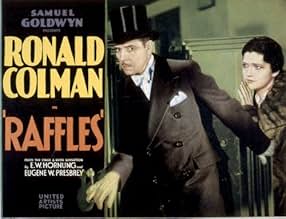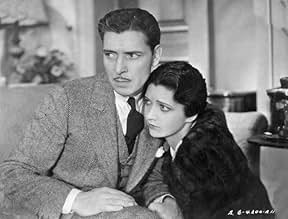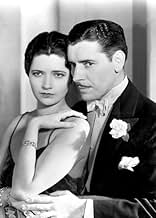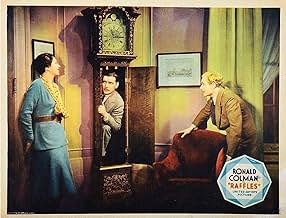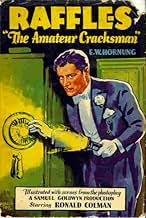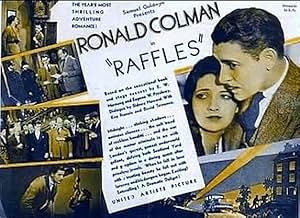Raffles
- 1930
- 1 Std. 12 Min.
Füge eine Handlung in deiner Sprache hinzuA distinguished English gentleman has a secret life--he is the notorious jewel thief the press has dubbed "The Amateur Cracksman". When he meets a woman and falls in love he decides to "reti... Alles lesenA distinguished English gentleman has a secret life--he is the notorious jewel thief the press has dubbed "The Amateur Cracksman". When he meets a woman and falls in love he decides to "retire" from that life, but an old friend comes to him with a predicament that entails him com... Alles lesenA distinguished English gentleman has a secret life--he is the notorious jewel thief the press has dubbed "The Amateur Cracksman". When he meets a woman and falls in love he decides to "retire" from that life, but an old friend comes to him with a predicament that entails him committing one last job.
- Regie
- Drehbuch
- Hauptbesetzung
- Für 1 Oscar nominiert
- 2 Gewinne & 1 Nominierung insgesamt
- Lord Harry Melrose
- (as Frederic Kerr)
- Lord Melrose's Butler
- (Nicht genannt)
- Harry - Lord & Lady Melrose's Friend
- (Nicht genannt)
- Gwen's Friend
- (Nicht genannt)
- Party Guest
- (Nicht genannt)
Empfohlene Bewertungen
The Raffles stories were extremely popular and have been the subject of many film, theater, and television treatments. One of the best of these is this 1930, very early talkie starring cinema's quintessential English gentleman, Ronald Coleman. It's really quite a good film for its time, with an intelligent script, generally good acting (especially by Coleman and character actor Frederick Kerr, better known as Baron Frankenstein in James Whale's famous 1931 treatment of the monster story, who steals every scene he is in as a grouchy English lord.) Co-cinematographer Gregg Toland, who later worked on many Hollywood classics, is presumably responsible for the film's noirish, atmospheric lighting effects.
All in all, I'd say this entertaining film will still be enjoyed by today's audiences, and is a must see for fans of Coleman.
Raffles has been a reformed ex-Cracksman for a few hours but finds he suddenly has to help his limp friend Bunny repay £1000 within 2 days and he only knows one way to get it. An invite to Lady Melrose's country house for cricket and a garden party of hundreds provides him with the chance and also a gang of six ineffectual Cockney burglars who skulk around in the dark loudly laying their plans. The scene where the burglar is caught and venomously points out Raffles on the stairs is pivotal to the film but it never recovers from the clumsy handling of it did Colman know what to say at that point? Colman was great in the role, his clipped accent and perfect diction usually used to good effect. Good support was from Kay Francis who played his understanding girlfriend although she didn't get to say Divine, and David Torrence the chunky and heavily cloaked Scotland Yard Inspector. Favourite bit: the torchlit confrontation between Raffles and Crawshay in the bedroom at midnight.
Simple old fashioned entertainment - I stick it on every few years without fail because with all its faults I like this one.
Raffles the English gentleman has a discreet sideline as a burglar and jewel thief. The press has dubbed him 'The Amateur Cracksman', and as such he has become a household name. Now that he has fallen in love with the sophisticated Gwen (Kay Francis) and proposed marriage to her, Raffles has decided to retire from crime. However, his old pal Bunny is in a spot of bother. Bunny has been playing cards again, and has run up a gambling debt of £1,000. If Bunny is to be rescued from his predicament, Raffles will have to take on the Melrose 'job' ...
Ronald Coleman gives us his trademark suave Englishman in the title role. We see him burgling a jeweller's shop wearing a top hat (note the excellent Toland touch of the policeman silhouetted against the window drape). Our first real glimpse of the hero comes on the dance floor as he sweeps Gwen around in a romantic waltz. On the cricket field at Lord Melrose's place, Raffles is of course dashing, and wins the game (even though he was not supposed to be playing - he invited himself along for the weekend at the last minute). Even when Inspector Mackenzie has him on the ropes, Raffles remains the epitome of poise and wit.
"All bubbles and froth - no taste," says Lord Melrose, giving his verdict on champagne. It is a reasonable comment on the film itself, which for all its pretensions to style is basically an inelaborate crime flick. We have the 'two Englands' crudely juxtaposed - one urban and ugly (the cloth-capped burglars from the pub, the 'pea soup' fog in London) and the other bucolic and 'refayned' (Lady Melrose's soiree). The film takes it for granted that the lower classes are unpleasant.
However, there are good things in this movie. The cricket match is fun, and tolerably well done, though Raffles' bowling action is highly dubious and the umpire's position would make lbw decisions interesting to say the least. The skylight scene on Raffles' apartment roof is an arresting image.
There is also a large portion of baloney. Does Scotland Yard protect country houses against burglary? Is this best done by surrounding them with a dozen detectives throughout the night? Why don't these detectives catch the various burglars who enter the premises? If closing the sash window is enough to stop the burglar alarm from ringing, then it isn't much of a burglar alarm. The 'common' burglars crouch in the shrubbery and talk aloud, spelling out their plans in pedantic detail, conveniently allowing Raffles to overhear. Is it not slightly more probable that they would have worked out what to do before entering the property?
The film ends in a flurry of increasingly silly activity. Blatant undercranking of the camera makes Raffles' escape dash look ridiculous, and his place of concealment is laughable.
Verdict - An enjoyable crime caper with absurd elements.
Raffles is a celebrated cricket player and as such has entrée into all the proper British upper class homes of the between the two World Wars period. He also has an interesting sidelight as a thief, in his own way, admired even by the police for his skill at his craft as Cary Grant in To Catch A Thief.
Colman has made up his mind to steal a valuable necklace from Alison Skipworth, but a rather nasty complication sets in in the person of Bramwell Fletcher a friend who seems to have written a check for far more funds than he has. Fletcher attempts suicide at Colman's apartment and Colman says he'll help.
In this very short, barely over 70 minute feature film, Colman has the unusual task of, accomplishing his objective in stealing the necklace, avoid detection by the police in the person of amiable Scotland Yard Inspector David Torrence, help poor Fletcher out with his problem, and last, but certainly not least win the love of long time girl friend, Kay Francis.
In a very cleverly written script Colman does accomplish nearly all, but the strength of Raffles is the telling of the tale of how he managed it all. Let's say that Colman is one clever guy who thinks very fast on his feet.
Despite the well chosen supporting cast by Sam Goldwyn, Raffles is a film held together by the charm and personality of Ronald Colman. Much the same way as the 1939 version of Raffles that Goldwyn did is held together by David Niven.
And if you're a Ronald Colman fan who like I could listen to him recite the Erie County Phone Directory, than Raffles is an absolute must for you.
"Raffles" is about a gentleman who is also an amateur thief--and a very talented one. While his society friends adore Raffles (played by Ronald Colman at his charming best) because of his wit, sporting skills and fine manners, they don't realize HE is this thief. Much of the film concerns his attending a particular weekend party in order to steal a necklace so he can use the money to help a friend in dire straits. However, along the way he meets up with a swanky lady (Kay Francis) and he's torn between his life of crime or becoming 100% legitimate for her sake. What will Raffles do? And what will Raffles do when ANOTHER crook shows up as well?! All in all, "Raffles" is a pleasant and a bit too talky film. Personally, I think it would have been better with more outdoor scenes and action. But again, 1930 was still a transitional year for sound and the stagy production was pretty typical. I also thought Raffles' 'brilliant' escape at the end was anything but. However,the acting was good and it was nice to see a detective who was NOT stupid (a common and rather dumb cliché of the 1930s and 40s). Well worth seeing but not among Colman's best work.
Wusstest du schon
- WissenswertesThe last Samuel Goldwyn movie to be shot simultaneously in silent and talkie versions.
- PatzerWhen the alarm goes off and the cat burglar is attempting to escape, Bunny's bedroom windows are show to be wide open, which would have prevented the alarm being set in the first place.
- Zitate
Inspector McKenzie: Good heavens! In the tobacco! Well, I'll be...
A.J. Raffles: Yes, I thought that you would be.
- Alternative VersionenRaffles (1930) was made simultaneously in silent and talking versions. With almost all the theaters in the USA wired for sound, this was to be the last film that Samuel Goldwyn produced in this manner.
- VerbindungenReferenced in The Devil Is a Sissy (1936)
- SoundtracksThe Blue Danube
(uncredited)
Written by Johann Strauss
Heard when Raffles takes Lady Melrose to her room.
Top-Auswahl
- How long is Raffles?Powered by Alexa
Details
- Erscheinungsdatum
- Herkunftsland
- Sprache
- Auch bekannt als
- Herr Raffles gör visit
- Drehorte
- Produktionsfirma
- Weitere beteiligte Unternehmen bei IMDbPro anzeigen
Box Office
- Bruttoertrag in den USA und Kanada
- 1.000.000 $
- Laufzeit1 Stunde 12 Minuten
- Farbe
- Sound-Mix
- Seitenverhältnis
- 1.20 : 1
Zu dieser Seite beitragen


